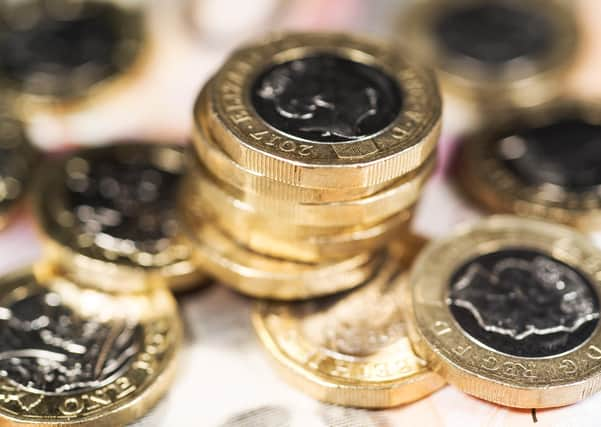UK on track for largest decline in annual GDP for 300 years


The Office for Budget Responsibility (OBR) said the “UK is on track to record the largest decline in annual GDP for 300 years”, warning that the economy could shrink by as much as 14.3 per cent in 2020.
In its latest set of financial forecasts, it said a worst-case scenario would also not see GDP recover to pre-crisis levels until the third quarter of 2024.
Advertisement
Hide AdAdvertisement
Hide AdGovernment measures to address the impact of the virus will also result in an “unprecedented peacetime rise in borrowing” this year, to between 13 per cent and 21 per cent of GDP, with the OBR currently predicting borrowing of £322 billion.
The forecasts will dampen hopes the UK can rapidly escape from the crisis with a ‘v-shaped’ recovery, and instead raises the prospect of deep economic scarring with huge debt and levels of unemployment not seen since the 1980s.
The SNP will use a debate in the Commons today to demand an extension to the post-Brexit transition phase, to avoid adding the disruption from the possible failure of trade talks with the EU to the impact from the coronavirus crisis.
And Labour said the stark unemployment forecasts should force the government into extending the furlough and self-employed wage support schemes beyond October, when they are due to end.
Shadow Chancellor Anneliese Dodds said the OBR’s analysis was “very worrying”.
“Unless the Government takes urgent action, the UK’s unemployment crisis is going to get much worse,” she said.
“The Chancellor must now listen to calls from Labour, business and trade unions and make the Job Retention Scheme live up to its name. Instead of withdrawing support across the piece, he must target it to sectors where it’s needed most.
“If he doesn’t act, even more people run the risk of being thrown into the misery of unemployment and our economy will continue to suffer.”
Advertisement
Hide AdAdvertisement
Hide AdEven under the OBR’s most optimistic scenario, unemployment is expected to double by the start of the third quarter as wage subsidies for the UK’s 9.4 million furloughed workers, to 9 per cent. Under the worst case scenario, unemployment would only peak in 2021 at more than 13 per cent, with joblessness remaining elevated through to 2025.
James Smith, research director at the Resolution Foundation, said: “The OBR’s forecasts reiterate the scale of the hit to our economy and public finances from the pandemic.
“With unemployment projected to match - or even surpass - its 1980s peak, the Chancellor has taken a significant gamble in not setting out more support for demand and employment in the hardest-hit sectors of the economy.
“The risk of 1.3 million furloughed workers moving straight into unemployment should prompt the Chancellor to consider further action on jobs.”
Figures from the Office for National Statistics (ONS) showed the UK economy grew in May by 1.8 per cent, after lockdown wiped a fifth off the value of the economy.
But the modest increase fell far short of the 5 per cent rise predicted by a consensus of economists.
Suren Thiru, the head of economics at the British Chambers of Commerce, said: “The pickup in output in May is more likely to reflect the partial release of pent-up demand as restrictions began to loosen, rather than evidence of a genuine recovery.
“While UK economic output may grow further in the short term as restrictions ease, this may dissipate as the economic scarring caused by the pandemic starts to bite, particularly as government support winds down.”
Advertisement
Hide AdAdvertisement
Hide AdThe OBR report, expected to be the final publication before Robert Chote steps down as chairman in October, also said that Government policy interventions announced before 26 June its borrowing projections by around £142bn for the financial year, in its middling scenario. Measures introduced in the Chancellor’s summer statement last week could add a further £50bn to borrowing for the year, it added.
But the Confederation of British Industry (CBI) warned Chancellor Rishi Sunak of trying to impose fiscal discipline this year.
CBI chief economist Rain Newton-Smith said the autumn budget is “likely to be too early to make significant inroads through tax rises and public spending cuts”.
SNP Westminster leader Ian Blackford said: “There are just six months left until the transition period ends – but little progress has been made and there is no good deal in sight. All of the options being considered would inflict lasting damage to the economy and leave the UK poorer and worse off.
“With businesses struggling to survive and thousands of jobs being cut, we cannot afford a Tory Brexit crisis piled on top of the coronavirus emergency we already face.
“Crashing out of the EU would be damaging at any time but it is extremely reckless in the middle of a global pandemic.”
Comments
Want to join the conversation? Please or to comment on this article.